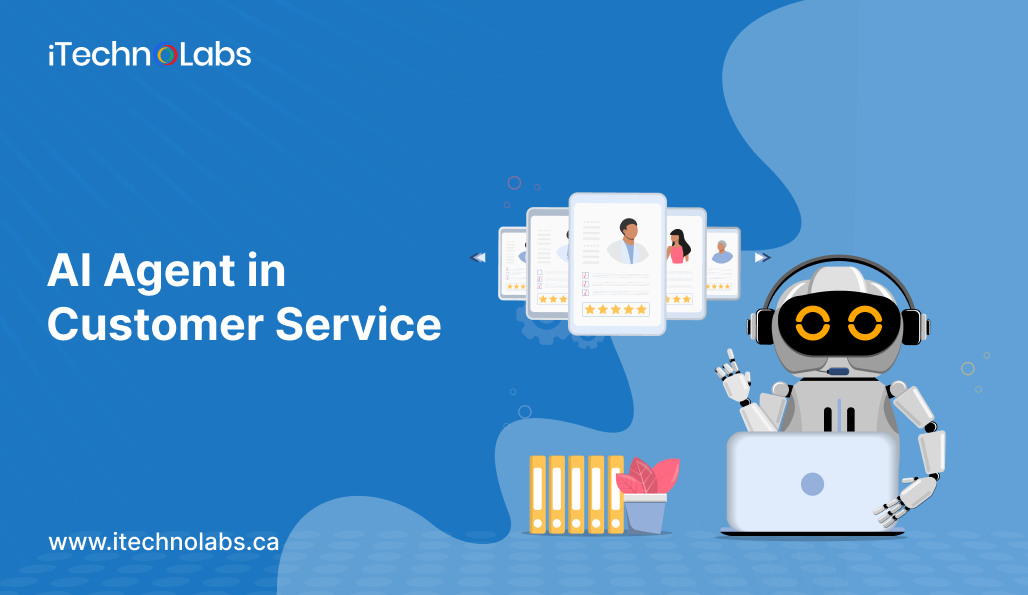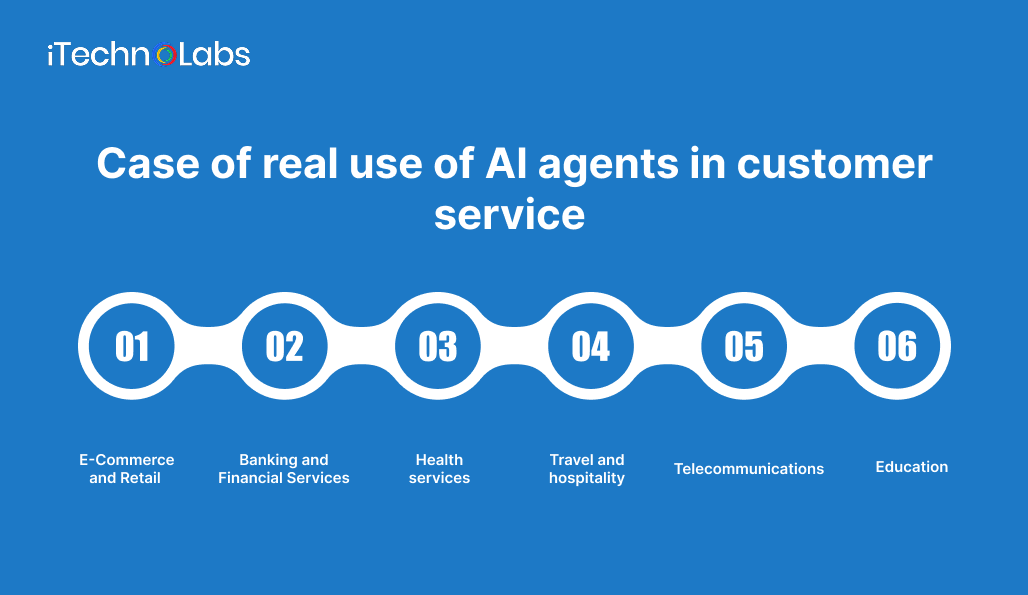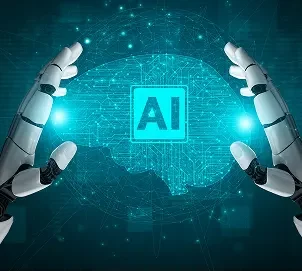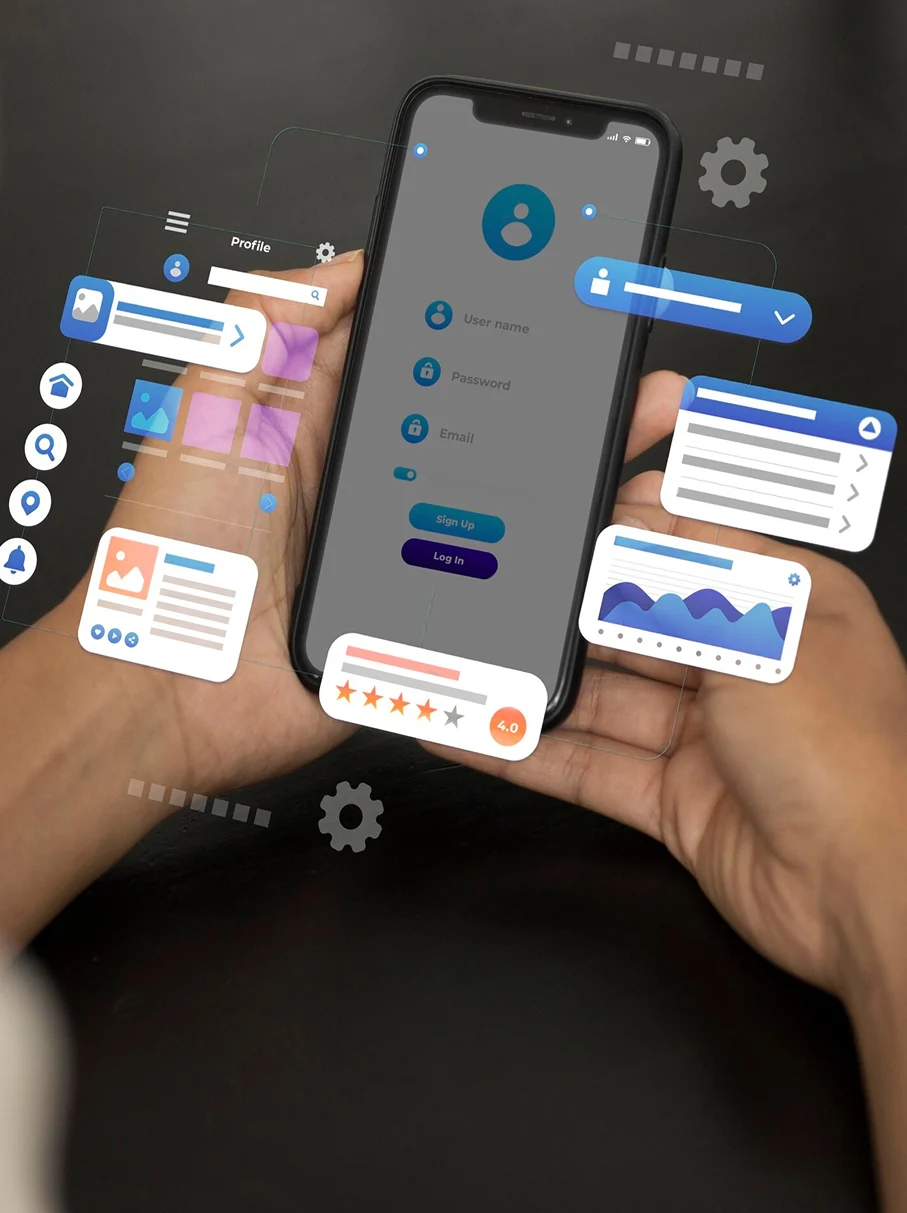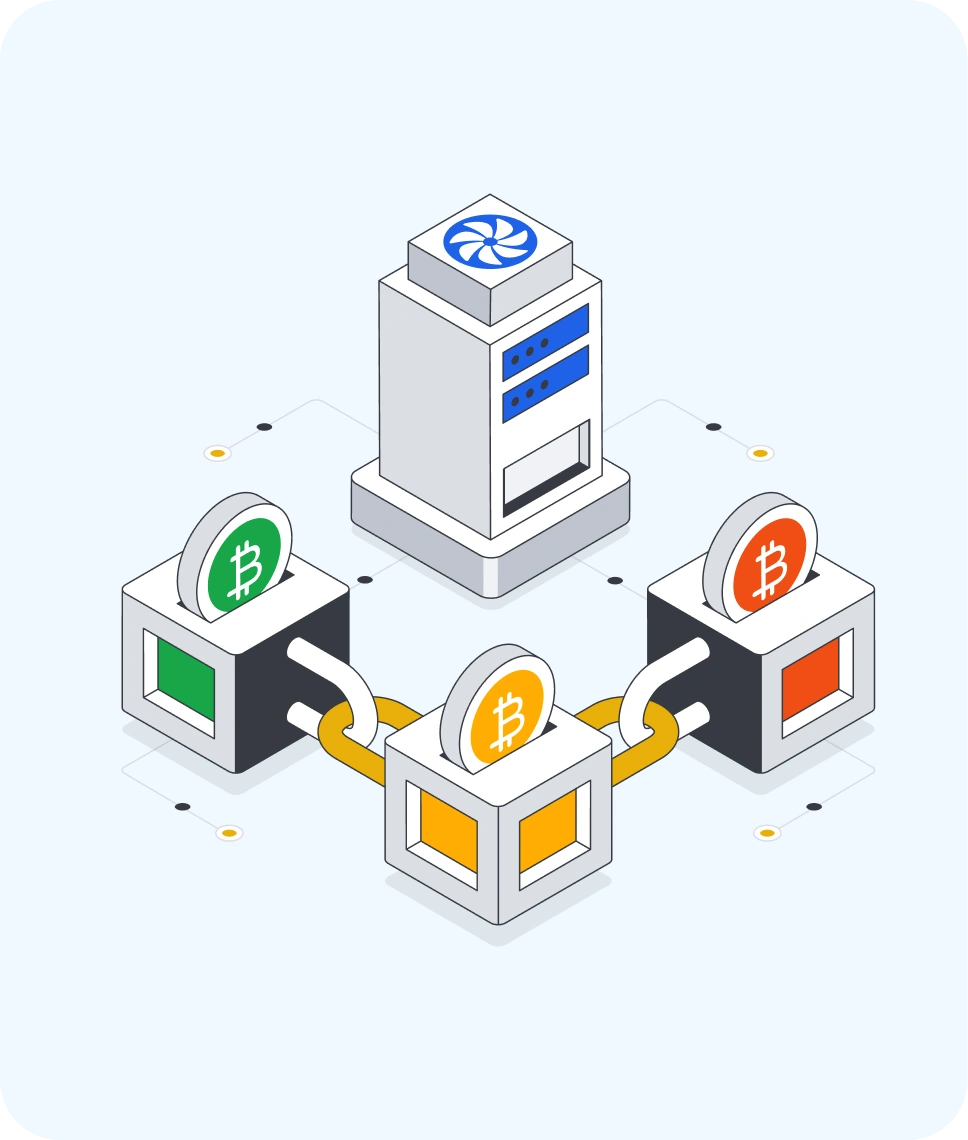In today’s digital economy, customer service is no longer just a support ceremony; this customer experience and brand have become the backbone of loyalty. Companies in industries are under constant pressure to provide fast, smart and more personal support. Traditional customer service teams, although skilled, are often limited by time, scalability and human ability. The difference between the customer’s expectations and service distribution has led to a rapid increase in the AI agents in customer service.
An AI agent in customer service is an intelligent, automated system that benefits from interacting with artificial intelligence, solving questions and streamlining communication. Unlike old chatbots, which follow stiff scripts, modern AI agents are designed with advanced natural language treatment (NLP) and machine learning skills, enabling them to understand references, optimise reactions and handle a wide range of requests with human efficiency.
Global adoption of AI-operated customer support equipment is increasing rapidly. Companies must create solutions to their unique business requirements for AI agent development companies. With special AI-agent development services, intelligent support can support websites, apps and customer help integrate on platforms, which ensure spontaneous and effective communication.
This blog suggests how AI agents should shape customer service, the benefits they provide, questions about the use of the real world, and challenges to assess and collaborate with an experienced development company to help companies unlock their full capacity.
What is an AI Agent in Customer Service?
The AI agent in customer service is a wise virtual accessory designed to communicate with customers and solve real-time information. Unlike traditional robots, which rely on pre-demagogic reactions, AI agents are run by advanced technologies such as Natural Language Processing (NLP), Machine Learning (ML) and Generative AIs, which enable them to interpret human intentions and react to learning.
In the core, an AI agent acts as a bridge between a business and its customers. This can be attached through online chats, mobile apps, emails or even voice-based interactions through many channels, which can ensure that customers can ensure that when and where they need it. These agents can handle repetitive inquiries like questions relating to order status, resetting a password or common product inquiries, while users are able to also assist users with more complex issues through step-by-step guidance.
The main difference between a basic chatbot and a modern AI agent is intelligence and flexibility. A chatbot is based on the rules and can therefore only provide limited answers based on a specific script. Conversely, an AI agent in customer service understands the nuances, identifies customer feelings and adopts their reactions to provide a more human-like and personal experience.
Many companies are now investing in sight solutions through the AI Agent Development Company, which specialises in creating tailor-made intelligent assistants and alliances with industry requirements. With professional AI agent development services, companies can design agents that not only increase customer help but also originally integrate into the CRMs, ticket systems and knowledge places for knowledge, making them an indispensable tool for modern customer commitment.
Key Benefits of AI Agents in Customer Service
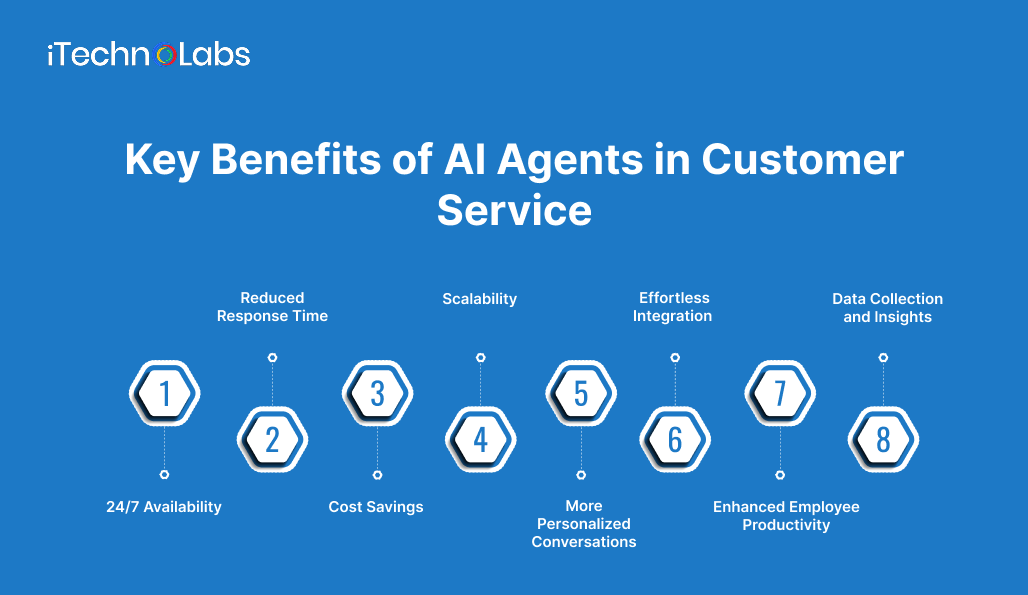
For instance, using an AI agent in customer service isn’t simply about automating processes; it is about completely transforming the customer experience while also ensuring that your company’s operations are as efficient as possible. Here are the biggest benefits an organisation can expect to see:
1. 24/7 Availability
Customers don’t adhere to business hours anymore; they expect immediate help around the clock.AI agents are available for 24/7 customer support, so no customer question is left unanswered. Even emergencies like troubleshooting at midnight on your website! Adding an AI agent means customers’ questions are answered, and they will return.
2. Reduced Response Time
Long customer service wait times are incredibly annoying. AI agents can instantly respond to frequently asked questions, access account details, and troubleshoot basic issues, and they can often deliver these responses in real time. AI agents reduce average response time and improve customer satisfaction.
3. Cost Savings
The cost of hiring human agents and boarding can be expensive, especially for companies that receive high amounts of questions. AI agents can handle large-scale replies and low-complicated questions, allowing organizations to save a significant amount of labour costs and deliver the same level.
4. Scalability
Many dealers experience customer inquiries during a busy time, such as a holiday sale or product launch. Unlike a human team, which will require work and training, the AI agent is easy to adjust thousands of conversations together without losing the quality.
5. More Personalized Conversations
Today’s AI agents benefit from data to provide more personal solutions. For example, they may recommend products based on surf history, refer to their reactions based on the customer’s behaviour, or even assess the feeling of adapting the tone.
6. Effortless Integration
AI agents are easily integrated with CRM software, ticketing systems and knowledge bases to access the most relevant information. This allows them to provide frequent, accurate reactions to customers regardless of their favourite contact method.
7. Enhanced Employee Productivity
Through support of routine queries, the AI agents empower human agents to respond to more sophisticated cases that require empathy, ingenuity, and critical thinking. The better balance will improve agent engagement as well as all-around efficiency.
8. Data Collection and Insights
AI agents not only serve customers but also gather valuable insights on their preferences, behaviour and pain points. Companies can use this data to limit strategies, improve products and estimate customer needs.
In short, AI agents provide a win-win landscape: customers get fast, smart and more personal support, while companies benefit from low costs, high efficiency and strong customer loyalty.
Case of real use of AI agents in customer service
When we look at practical applications in industries, the real power of the AI agent in customer service becomes clear. From retail to the healthcare system, AI agents prepare the way to interact with customers.
1. E-Commerce and Retail
In online shopping, customer expectations are sky-high. AI agents assist shoppers by recommending products, answering order-related queries, and even helping with returns or exchanges. For example, an AI agent can suggest outfits based on browsing history or provide real-time updates on delivery status, creating a seamless shopping experience.
2. Banking and Financial Services
Banks and financial institutions handle large versions of daily enquiries. AI agents streamline procedures by providing immediate account information, helping with loan applications or guiding customers through password reset. They also add an extra layer of certainty by confirming the customer identification before processing the requests.
3. Health services
Healthcare professionals use AI agents to increase the patient’s involvement. Virtual assistants plan appointments, remind about drugs, and answer questions related to general health. For example, a patient may interact with the AI agent to order a check without waiting in long call queues.
4. Travel and hospitality
Airlines and the hotel customers trust AI agents a lot to get help. They help passengers with confirmation of ordering, changes in the travel programme or updates of the flight status in real time. In hotels, AI agents act as virtual concierges, helping guests with restaurant recommendations, check-in procedures and local attractions.
5. Telecommunications
Telecom companies face constant enquiries about billing, network issues, or plan upgrades. AI agents provide quick troubleshooting, guide users through device setups, and offer plan suggestions based on customer usage patterns.
6. Education
In online educational platforms, AI agents work as student assistants; students answer questions, guide them through course modules and offer personal learning recommendations. This not only improves the student engagement but also reduces the burden on assistant employees.
By distributing AI agents in these scenarios, companies increase customers’ satisfaction, reduce operating costs and ensure continuity in service distribution. A partnership with the AI Agent Development Company helps organisations design custom agents that fit their industry, ensuring maximum impact.
Challenges & Considerations of AI Agents in Customer Service
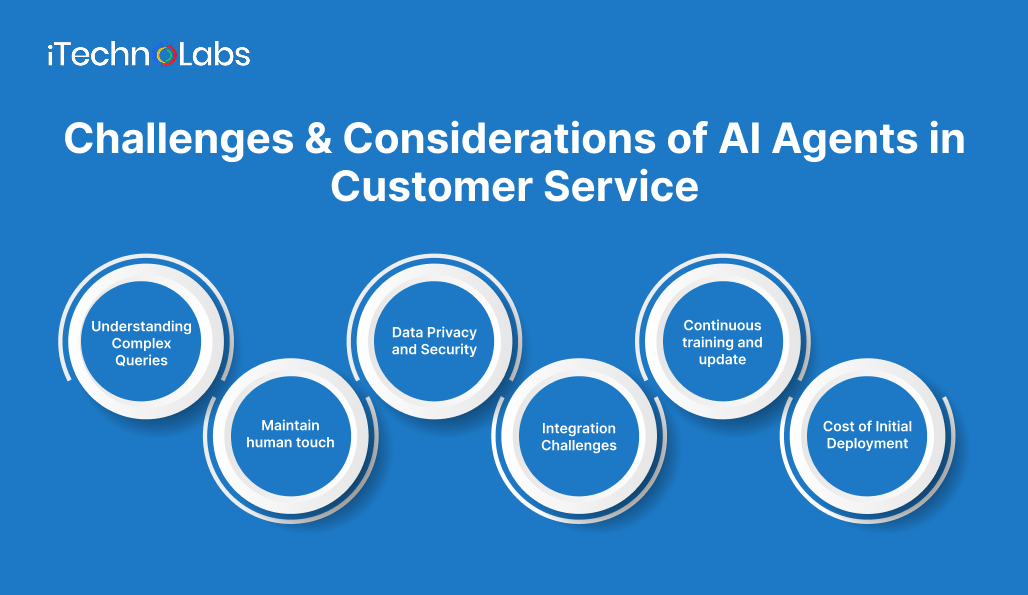
While an AI agent in customer service brings undeniable advantages, its implementation is not without challenges. Businesses must carefully consider these factors to ensure success:
1. Understanding Complex Queries
AI agents stand out in repetition and direct tasks, but they can struggle with very complex or vague questions. Without proper training and growth mechanisms, customers can be disappointed if their problems are not solved.
2. Maintain human touch
Customers often expect sympathy and emotional understanding that some AI cannot repeat completely. It is important to create the right balance between automation and human interactions. Many organisations use a hybrid model, where AI agents handle basic requests and escalate complex problems for human employees.
3. Data Privacy and Security
AI agents treat sensitive customers such as payment details, personal information and account entries. Companies should follow data protection rules (for example, GDPR) and ensure strong encryption to build trust and avoid legal complications.
4. Integration Challenges
Integrating AI agents into existing CRMs, ticket platforms or ERP systems can be technically complicated. Poor integration often results in fragmented customer experience and inconsistent data flow. An experienced AI agent with the development company can help remove these obstacles.
5. Continuous training and update
AI agents are not “set-and-colour” solutions. They require regular training with updated data sets, new FAQs and customer behaviour patterns. Without ongoing adaptation, their efficiency can subside over time.
6. Cost of Initial Deployment
Although AI agents reduce long-term operational costs, the upfront investment in AI agent development services including customisation, training, and integration, can be significant. Companies must view it as a strategic, long-term investment.
By addressing these challenges proactively, businesses can maximize the efficiency of AI agents while ensuring customers continue to feel valued and understood.
Suggested article: Machine Learning Security and Surveillance Systems: Smart Solutions 2025
Why Partner with an AI Agent Development Company
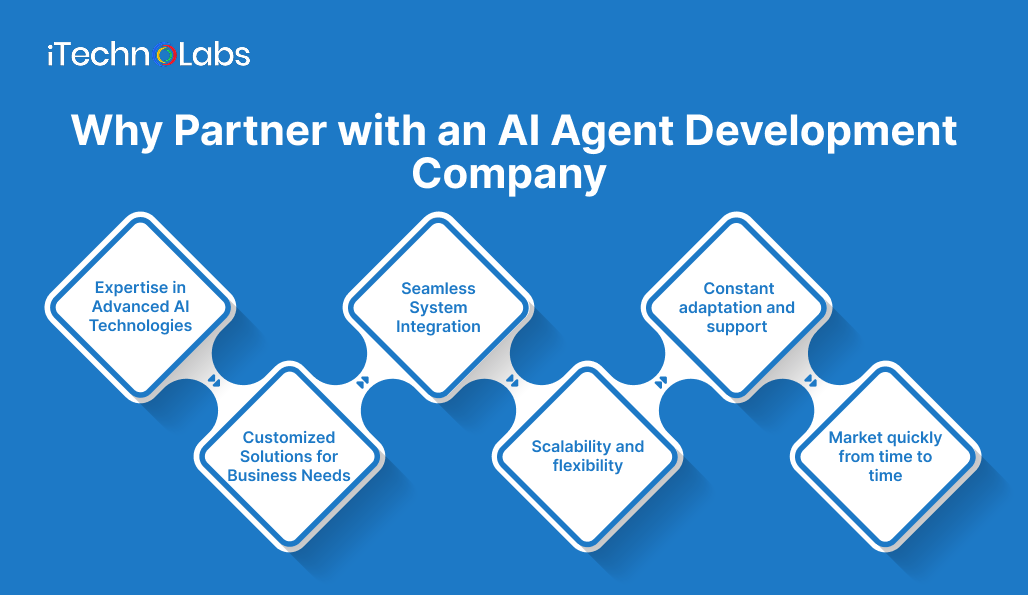
Building an AI agent in customer service may sound straightforward, but creating a truly intelligent, reliable, and scalable solution requires specialised expertise. This is where partnering with an AI agent development company becomes a game-changer.
1. Expertise in Advanced AI Technologies
AI agents are run by complex technologies such as natural language processing (NLP), machine learning and predictive analysis. A professional development company brings deep technical expertise to designing references, feelings and intentions of designing agents, which can distribute robots outside the shelf.
2. Customized Solutions for Business Needs
Every business has unique customer service requirements. For instance, an e-commerce company may need a product recommendation engine, while a bank may prioritize secure identity verification. An AI agent development company creates tailored solutions aligned with your industry, ensuring the agent fits seamlessly into your workflows.
3. Seamless System Integration
AI agents will work harmoniously with existing systems such as CRM, ticket tools and databases. Development companies offer smooth integration services, which ensure frequent data flow and accurate, real-time customer help.
4. Scalability and flexibility
As your business grows, customers require service. A professional team ensures that your AI agent is scalable, able to increase the query volume without compromising on performance. They also design flexible structures to support future upgrades and facilities.
5. Constant adaptation and support
The launch of the AI agent is just the beginning. Development companies update time to improve accuracy and responsibility, customer interaction monitoring and algorithms. This ensures that your AI agent develops with the expectations of your customers.
6. Market quickly from time to time
Instead of building your own AI solution, which can take months or years, it accelerates working with a particular company. Getting a competitive advantage, companies can go fast with AI-operated customer service.
In short, a reliable AI agent development company helps companies reduce risk, adapt resources and offer customer service solutions that are both intelligent and reliable.
AI Agent Development Services Explained
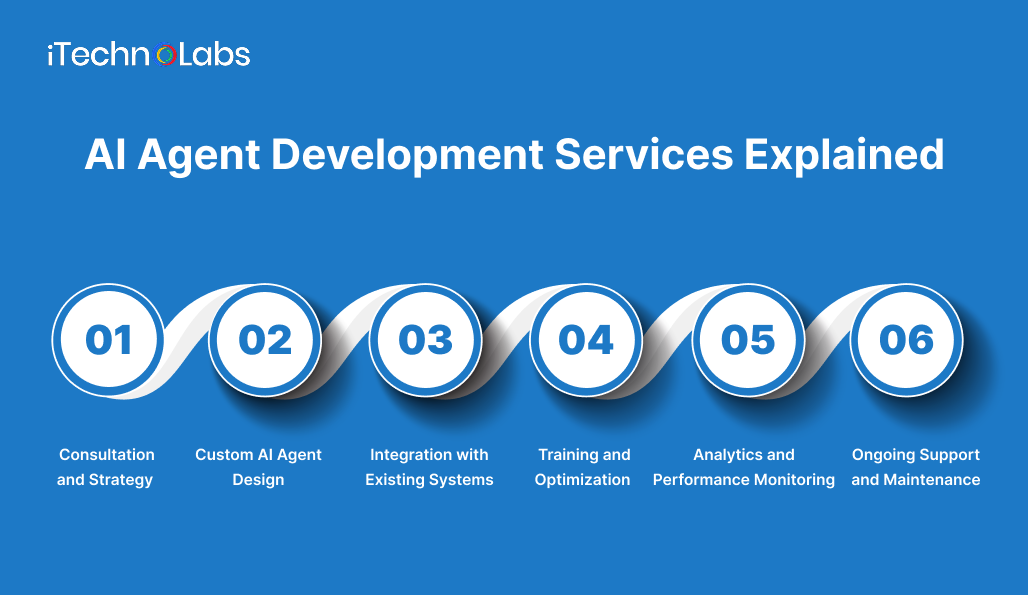
To maximise the potential of an AI agent in customer service, businesses often rely on specialised AI agent development services. These services cover every stage of creating, deploying and optimising intelligent agents that align with business goals. Let’s break down what they typically include:
1. Consultation and Strategy
The process begins with a deep dive into your business needs, customer pain points, and industry requirements. Development companies help identify where AI agents can deliver the most value, ensuring the strategy is aligned with customer service objectives.
2. Custom AI Agent Design
Every business requires a unique approach. Through custom design services, companies build AI agents that reflect their brand voice, customer expectations, and use cases. For example, a luxury hotel chain may need a polite, formal tone, while an e-commerce store may opt for a more casual and friendly interaction style.
3. Integration with Existing Systems
AI agents become truly powerful when integrated with existing systems like CRMs, ERP platforms, ticketing tools, and knowledge bases. Development services ensure smooth connectivity, enabling agents to pull real-time data and deliver accurate responses.
4. Training and Optimization
AI agents improve over time through continuous learning. Developers use machine learning models trained on historical interactions, FAQs, and user behavior data. Regular updates ensure the AI agent stays relevant and effective as customer needs evolve.
5. Analytics and Performance Monitoring
Advanced AI agent development services include analytics dashboards that track performance metrics such as response accuracy, resolution rates, and customer satisfaction scores. These insights help businesses measure ROI and make data-driven improvements.
6. Ongoing Support and Maintenance
After deployment, development companies provide technical support, bug fixes, and feature updates. This ensures the AI agent remains reliable and continues to deliver exceptional customer experiences over the long term.
By leveraging these services, businesses don’t just implement an AI solution they build a scalable, future-proof customer service system that grows with their organization.
The Future of AI Agents in Customer Service
The role of an AI agent in customer service is evolving rapidly, and the future holds exciting possibilities. As artificial intelligence technologies mature, customer interactions will become even more seamless, proactive, and personalized.
One major trend is the rise of generative AI, which enables agents to generate human-like, context-rich responses rather than relying solely on pre-trained scripts. This advancement will allow AI agents to handle more complex queries with a natural, conversational tone—bringing them closer to true human-level interaction.
Another key development is predictive customer service. Instead of waiting for a query, AI agents will proactively anticipate customer needs. For example, if a travel customer’s flight is delayed, the agent could automatically provide updated booking options or hotel recommendations before the customer even asks.
Integration with multimodal communication voice, chat, video, and even AR/VR platforms will further enhance customer experiences. Imagine a virtual AI concierge in a retail store, assisting customers both online and in physical spaces through augmented reality.
Additionally, as more companies adopt AI, the demand for AI agent development companies will grow, driving innovations in customization, security, and compliance. These firms will refine AI agent development services to ensure solutions remain ethical, transparent, and aligned with industry regulations.
Ultimately, the future belongs to businesses that embrace AI-driven customer support early. By blending automation with human empathy, organizations will not only reduce costs but also build stronger, lasting relationships with their customers.
Important Article: Artificial General Intelligence (AGI): Future of AI in 2025
Conclusion
The customer service landscape is undergoing a massive transformation, and at the center of this change is the AI agent in customer service. By delivering instant responses, reducing costs, and personalizing interactions, AI agents have become indispensable tools for businesses aiming to meet rising customer expectations.
From e-commerce and banking to healthcare and travel, AI-powered agents are already proving their value in real-world applications. However, to fully unlock their potential, businesses need more than just generic chatbots they need intelligent, adaptable, and scalable solutions. This is where the expertise of an AI agent development company becomes essential. With specialized AI agent development services, organizations gain access to custom design, seamless system integration, advanced analytics, and continuous optimization, ensuring long-term success.
Looking ahead, the capabilities of AI agents will only expand. With advancements in generative AI, predictive analytics, and multimodal communication, these intelligent assistants will move from being reactive problem-solvers to proactive partners in customer engagement.
The message is clear: businesses that embrace AI agents today will not only streamline support but also build stronger customer relationships and secure a competitive edge for the future.
FAQs
1. What is an AI agent in customer service?
An AI agent in customer service is an intelligent assistant that uses AI technologies like NLP and machine learning to provide instant, personalized customer support across multiple channels.
2. How does an AI agent improve customer support efficiency?
AI agents automate repetitive tasks, answer FAQs instantly, and scale support during peak hours. This reduces response times, improves customer satisfaction, and allows human staff to focus on complex queries.
3. Why should businesses hire an AI agent development company?
An AI agent development company provides expertise in AI technologies, ensures smooth system integration, and designs customized, scalable solutions that align with industry-specific customer service requirements.
4. What services are included in AI agent development services?
AI agent development services include consultation, custom design, system integration, training, optimization, analytics, and ongoing support ensuring businesses deploy intelligent, future-ready customer service solutions.
5. What is the future of AI agents in customer service?
The future includes generative AI for human-like conversations, predictive service for proactive assistance, multimodal communication, and smarter customization offered by AI agent development services for businesses worldwide.

